Off the grid
Going off the grid used to be a lovely romantic notion but completely out of the question for the majority of us. Now we have opted for prepaid electricity from the utility so there are no monthly charges. We use very little.
Going off the grid would have meant, inter alia, some expensive items.
- Purchasing a huge battery pack.
- And going without power and hot-water if there was an extended period of inclement weather.
This page was last updated on 14th May, 2025.
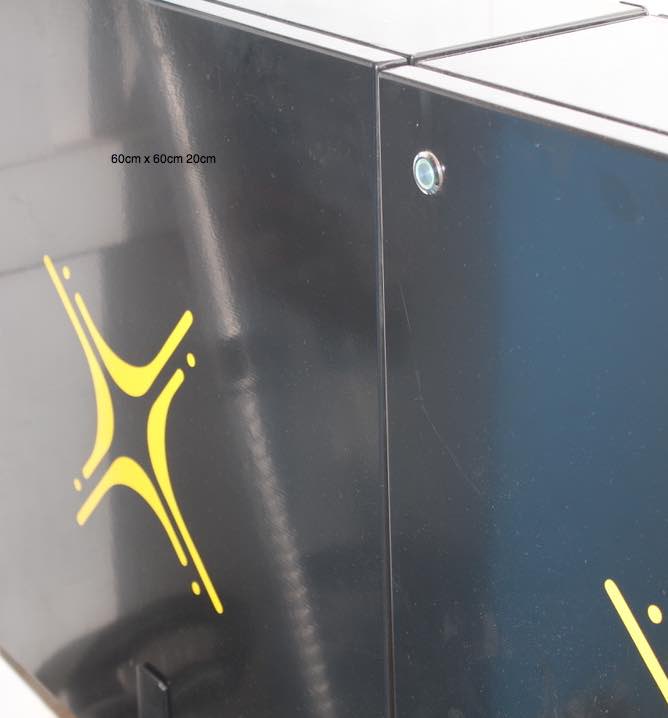
"If an idea does not appear bizarre, there is no hope for it."
- Niels Bohr
The batteries used to be the single most expensive item in your budget if you planned to build a solar-farm that was off the grid.
My old pack of 8 lead-crystal 200Ah batteries which was moderate in size but certainly not sufficient to go off the grid, would cost today nearly twice as much as our large 10kW inverter.
That is big enough to heat two ovens, the dishwasher and a pile of small electronic devices simultaneously; but hopelessly inadequate once the sun goes down with lead-batteries.
They are not only expensive but they remain relatively fragile. If you discharge them regularly beyond their tolerance one can easily shorten their lives by a half or more.
Redflow and lithium ion are the exceptions but were very expensive until recently; the latter have dropped remarkably in price. As from 2021 never use lead-cell batteries for solar power again.
A large part of the problem is that the new batteries currently being used require relatively modern technology; and nobody really knows how deeply you can discharge them or how often. Redflow claim you can completely drain theirs; lithium-ion advocates say to about 30%.
Different sites will proclaim wildly varying standards. In the case of my old lead-crystal batteries, the stats varied by fifty percent or more.
To my mind, it made no sense to shorten the lives of your expensive batteries by a half or more just to save 500 dollars of electricity from the grid per annum.

Sometimes circumstances force one to rethink old ideas. I reached that crossroads, confronted with a hopelessly faulty electricity bill which the authorities would not correct; and in the same week, a power surge from the grid that caused thousands of rands in damage.
Adding to the change of heart is that new lithium batteries that can be cycled far more deeply without damage; and a modern gas-geyser that could supply us with hot water on those foggy days was not out of the question.
Most of our hot water on sunny days comes from these vacuum-tubes; but when it is misty there is very little infrared radiation.
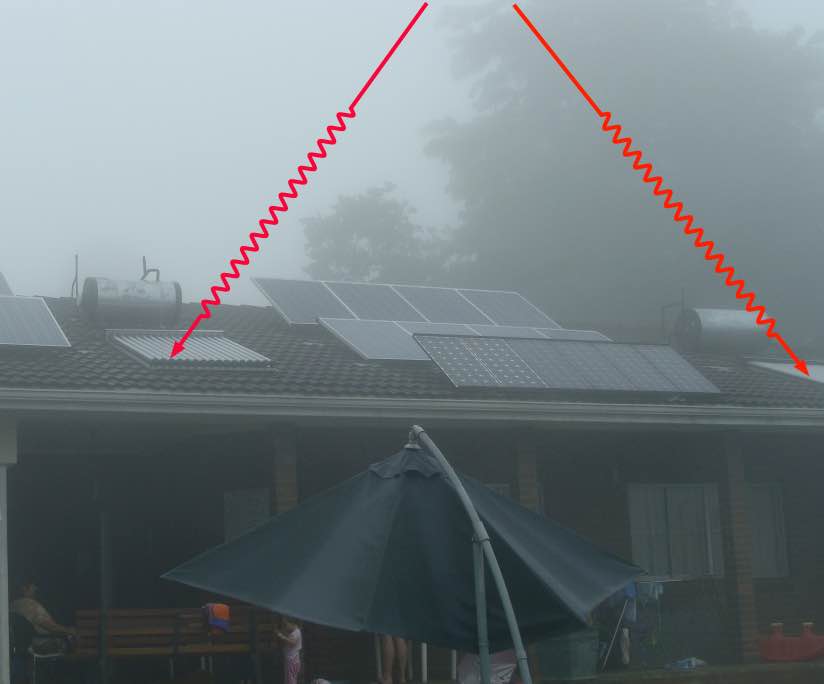 Very little infrared radiation to heat water
Very little infrared radiation to heat waterWe have been cogitating; watch this space.
Okay so in 2021 having been using solar-energy for ten years this is my final recommendation in South Africa where there is a very unreliable and unstable grid.
We are not off the grid but we have a prepaid connection with no monthly tariffs; pay only for what you use. The mains breaker is permanently down so we are not subject to surges and brown-outs. Twice in nearly a year we have needed electricity briefly from the utility to heat water for a hot shower during prolonged inclement weather.
We have 10 kilowatts of panels and two 7.4kWh lithium batteries; it is more than adequate and we are able to export large amounts to our daughter's home. We charge our E-car during the day.
The 10kW inverter is immensely powerful. We use the changeover-switch to heat the water in the geyser if there is insufficient sunshine.
Everything is dependent on having enough panels. Never go less than 5kW, a large inverter and sufficient storage in modern batteries.
We are completely unaffected by the load-shedding that is an almost daily feature of the new South Africa; our solar generator will be paid off shortly and then we have free power for the foreseeable future.
Updating this page in 2025 there are a few things to highlight.
- We have used 43kWh of grid power in the last three years; a negligible amount.
- Our solar generator is paid off, saving us in excess of R50,000 per year for two homes.
- Only for inclement weather we have added another 1600W of panels; the cost has come down dramatically.
- Equipment does fail periodically; currently a MPPT has been sent back to the manufacturer in Gqeberha (Port Elizabeth) for a repair.
- Load shedding hardly affects us.
- We have no contact whatsoever with irritating incompetent officials from City Hall.
Off the grid
Off the grid is a much better prospect, of course if you live in Arizona where there's little cloud cover. Every evening you are assured of a geyser filled with hot water and batteries that are fully charged.
But then you have to pipe in water from some distant source.
For the majority of us with access to both a municipal water supply and the electrical power grid, it used to make more sense to remain connected; but reduce our consumption of these utilities.
The material expressed on this page is gleaned from the nutritional and environmental literature; it is clearly referenced. A plain distinction is made between the author's opinion and that which is scientifically proven. When in doubt consult your health professional.
To suggest a correction or clarification, write to Dr Bernard Preston here. Contact.
Another consideration is that the inverter itself draws considerable power, whether you are using electricity or not; mine requires about 60 watts just to keep the element activated.
Leaving the inverter switched on all night whilst you are asleep, just to power perhaps three 10W flood lights and the fridge which might come on twice for a short period, would draw in excess of a kilowatt-hour; and place a considerable drain on an old lead battery pack.
We used to turn it off when we went to bed; and draw a small amount of electricity from the grid. That is rarely necessary these days with modern batteries.
The purist who wants to be off the grid will see it in another light. He is willing to sacrifice his batteries and that is okay; different strokes for all folks. But it is quite an expensive luxury beyond the means of the majority.
For those who live in an area where there is frequent wind or running water at night, it is another matter; but they are the lucky minority who have other sources of green-energy.
But now in 2025 these lithium-ion batteries are within the price range of most of you reading this blog. They are no longer impossibly expensive and have not the slightest problem with the inverter staying on all night; except very occasionally during prolonged misty weather.
Harvesting rainwater
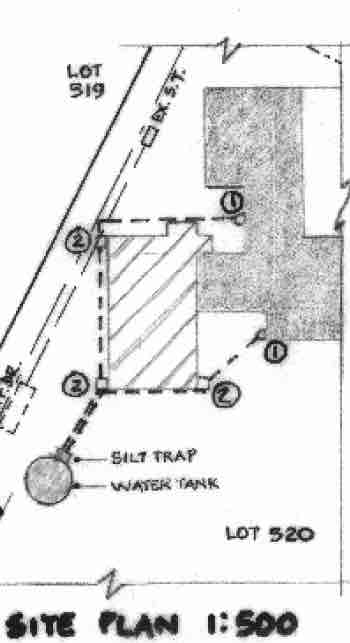
Harvesting rainwater from the roof is a simple business involving a network of underground conduits from the gutter down-pipes (labelled 1 and 2) leading to a series of tanks or better still, an underground reservoir. If you're off the grid then you must have battery power to supply the pump.
It is not that different to harvesting sunshine and contemplating going off the grid.
Depending on the lie of the land a tank raised on a tower would provide pressure; it could be filled during the day. We live in a double story home. It would need to be very high; and the water warm from sunshine.
These underground standard sewage UG110mm conduits collect the water from the down-pipes, delivering the rain to a silt trap from which it overflows into a 27,000 litre reservoir; through a basic coarse filter. I wish I had made it larger. 5m in diameter would have been better for very little extra cost.
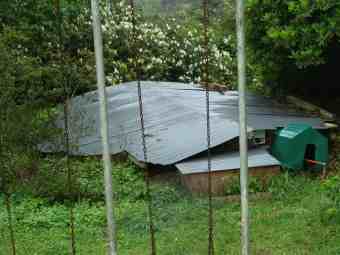
Harvesting sunlight
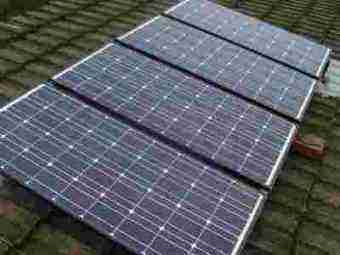
Harvesting sunlight is becoming more affordable; the price of photovoltaic-panels is coming down all the time. Also they are getting larger in size.
We have now added more panels so that we can go off the grid, to charge these lithium-ion batteries during cloudy weather.
Shadows on PV panels is something else to consider.
Solar generator
A solar generator means connecting the panels to a charge controller known as a MPPT and then to batteries and the inverter; it is a relatively straight forward business.
See solar powered generator for more details. Understand this fully before contemplating going off the grid.
Think hard about the size of the inverter for home before making a start; upgrading costs a lot more in the end. I wish I had gone straight to this 10kW big-boy; then it would have hurt only once.
And never go to anything less than a 48V system; the losses in the cabling are much greater at lower-voltages.
In short do it properly the first time. Think, plan and read; talk to people before making a hasty start.
Otherwise it hurts many times over.
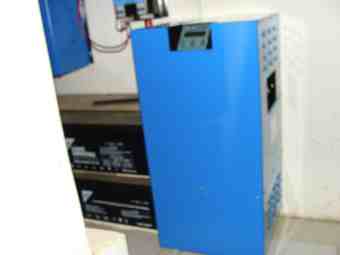 10kw inverter
10kw inverterChange over switch
A change over switch is vital if you are harvesting sunlight but also want to remain connected to the utility.
You will still need it if you are off the grid, to connect to a generator in times of inclement weather.
Newsletter
Our newsletter is entitled "create a cyan zone" at your home, preserving both yourself and Mother Earth for future generations; and the family too, of course. We promise not to spam you with daily emails promoting various products. You may get an occasional nudge to buy one of my books.
Here are the back issues.
- Lifestyle and ideal body weight
- What are ultra-processed foods?
- Investing in long-term health
- Diseases from plastic exposure
- Intensive lifestyle management for obesity has limited value
- A world largely devoid of Parkinson's Disease
- The impact of friendly bacteria in the tum on the prevention of cancer
- There's a hole in the bucket
- Everyone is talking about weight loss drugs
- Pull the sweet tooth
- If you suffer from heartburn plant a susu
- Refined maize meal and stunting
- Should agriculture and industry get priority for water and electricity?
- Nature is calling
- Mill your own flour
- Bake your own sourdough bread
- Microplastics from our water
- Alternative types of water storage
- Wear your clothes out
- Comfort foods
- Create a bee-friendly environment
- Go to bed slightly hungry
- Keep bees
- Blue zone folk are religious
- Reduce plastic waste
- Family is important
- What can go in compost?
- Grow broad beans for longevity
- Harvest and store sunshine
- Blue zone exercise
- Harvest and store your rainwater
- Create a cyan zone at your home
There are many different ways of connecting up your electrical supply. Initially my own home-grown ideas, borne out of several years of experience included these features.
- We had circuits that were entirely energised by the inverter, using solar power. When it was switched off at night they could not be powered up. Our computers for example are supplied entirely from our own electricity; only clean, reliable energy for them.
- Then there were circuits that could be energised from either the grid or the inverter, using the change over switch to toggle back and forth. For example, the electric oven could be powered during the day by the inverter when the sun was strong. At night however it could only be heated by the mains supply. Now all that has changed.
It is a manual system; if one sees a front approaching, then I can manually change over ahead of time to make sure the batteries are fully charged before the stormy-weather arrives.
Fully automated systems also exist that will seamlessly switch back and forth; for a price. Then you have to remain connected to the grid which is undesirable in South-Africa with its dirty power.
It's a new and for some restricted way of living; no electricity for the oven, geyser and dish-washer at night. When you go off the grid they can only be powered during the day.
Solar power energy
Solar power energy is there to be had but it does have pit falls. In theory, in the absence of inclement weather it can enable you to go off the grid.
In short we use less than 5kL of water and 20 kWh of electrical power per annum from the grid; but I am very pleased we are still connected for the geyser. That is far less than most folk need in a month.
Going completely off the grid seemed a pipe dream for us; it meant investing at least another $5000 in batteries. And we would still have cold showers when a five-day mist envelopes our village; it happens several times every year, living on top of an escarpment.
This page was written some ten years ago; now we have two large lithium batteries for $5000. Grid power is used only for the hot-water geyser.
Our two new lithium-ion batteries cost R90,000 but the inverter had to go back to the factory for new software.
Mains surges
I have been force to rethink my antipathy towards going off the grid; when you have an unstable voltage from the utility and incompetent technicians doing the maintenance, it can do tremendous damage to your home.
Just imagine this power-surge we had recently; it caused immense damage down our street.
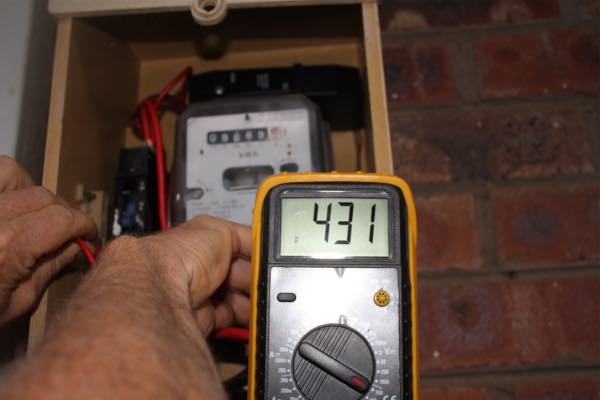
- Solar electric oven.
- Use induction cooktop stoves for real joy in the kitchen, saving both time and energy.
- Go off the grid with solar ... another viewpoint.
When browsing use right click and "Open Link in New Tab" or you may get a bad gateway signal.
Did you find this page interesting? How about forwarding it to a friendly book or food junkie? Better still, a social media tick would help.
Address:
56 Groenekloof Rd,
Hilton, KZN
South Africa
Website:
https://www.bernard-preston.com